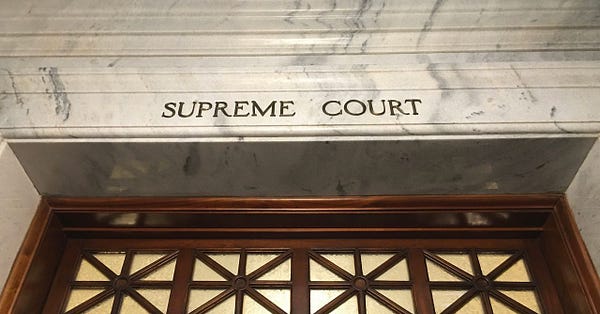Kentucky Court Kills Vouchers While Tennessee Looks to Expand Them
Plus, a note on merit pay in North Carolina
I’m pleased to note that The Education Report is surging toward 1900 subscribers! Thank you! I’d love to start 2023 with more than 2000 readers. If you’re already a subscriber, please forward to friends you think would be interested. Also, take a moment to consider the subscription options - while The Education Report is offered free as a way to promote a vigorous defense of public schools, your paid subscription helps support my work. If you’re already a free subscriber, just click on the button below to become a paid supporter! I appreciate all of you who read, share, and support this work.
The Kentucky Supreme Court last week killed the legislature’s plan to implement a school voucher scheme in the Bluegrass State.


Spectrum News 1 reports:
House Bill 563, dubbed the Education Opportunity Account Act or the school choice bill, was ruled unconstitutional and struck down by the Kentucky Supreme Court in a unanimous decision affirming Franklin Circuit Judge Phillip Shepherd's ruling.
Advocates for fiscal responsibility hailed the move and urged lawmakers to find ways to better fund Kentucky’s public schools:
The Kentucky Center for Economic Policy's senior fellow, Pam Thomas, said in a statement Thursday's ruling should motivate lawmakers to focus on strengthening public education.
"Lawmakers should now turn their attention away from inequitable and unconstitutional voucher programs and focus on their Constitutional mandate to ‘provide for an efficient system of common schools throughout the state.’ That means providing adequate funding to the many different components of successful public schools, including skilled teachers, up-to-date instructional materials, non-academic supports and safe learning environments. That’s how we ensure that all Kentucky children thrive, no matter their race, family income or zip code," Thomas said.
The unanimous decision likely dooms future attempts at school privatization through vouchers in Kentucky.

Meanwhile, in neighboring Tennessee, efforts are underway to expand privatization by way of both vouchers and charter schools.
Chalkbeat reports that Hamilton County state Senator Todd Gardenhire has introduced legislation that would expand the program to schools in Chattanooga.
Sen. Todd Gardenhire, a Chattanooga Republican, wants the legislature to expand the eligibility criteria for the education savings account program to include students in districts with at least five of the state’s lowest-performing schools, as identified in the last three “priority school” cycles since 2015.
Under those criteria, Hamilton County Schools, which is based in Chattanooga, would qualify
Make no mistake – the ultimate goal is full privatization of public education in Tennessee. It has been Gov. Lee’s goal all along.
The reality of vouchers, though, is that as the Kentucky Supreme Court suggests, they create two distinct school systems - and place an added burden on taxpayers.
In 2017, I took a look at Indiana’s voucher scheme and noted that it was then costing the state some $54 million in extra money each year.
A report on the program released by the Department of Education shows the program costs $54 million.
“If the idea behind a voucher program is we’re going to have the money follow the student, if the student didn’t start in a public school, the money isn’t following them from a public school, it’s just appearing from another budget,” [Researcher Molly] Stewart said. “And we’re not exactly sure where that’s coming from.”
Vouchers, then, create $54 million in new expenditures — an education funding deficit — in Indiana.
Following the math based on Indiana’s experience, Tennessee taxpayers could expect at least $100 million in additional education spending just to support vouchers. This could, of course, become larger as the program expands.
More on Merit Pay in North Carolina
North Carolina continues its ill-advised march toward a teacher merit pay scheme.
Educator and blogger Justin Parmenter writes in the Charlotte Observer that those pushing the scheme are deliberately excluding teacher voices from the process.
Rather than using teacher feedback to create more effective policy, DPI and the State Board have thus far focused on marginalizing educator concerns through marketing and public narrative control.
Moving forward, our leaders need to commit to a policy process which acknowledges the actual causes of our pipeline crisis and meaningfully involves classroom teachers in crafting an effective solution. That’s the kind of leadership that North Carolina’s long-suffering teachers and our 1.5 million students deserve.





